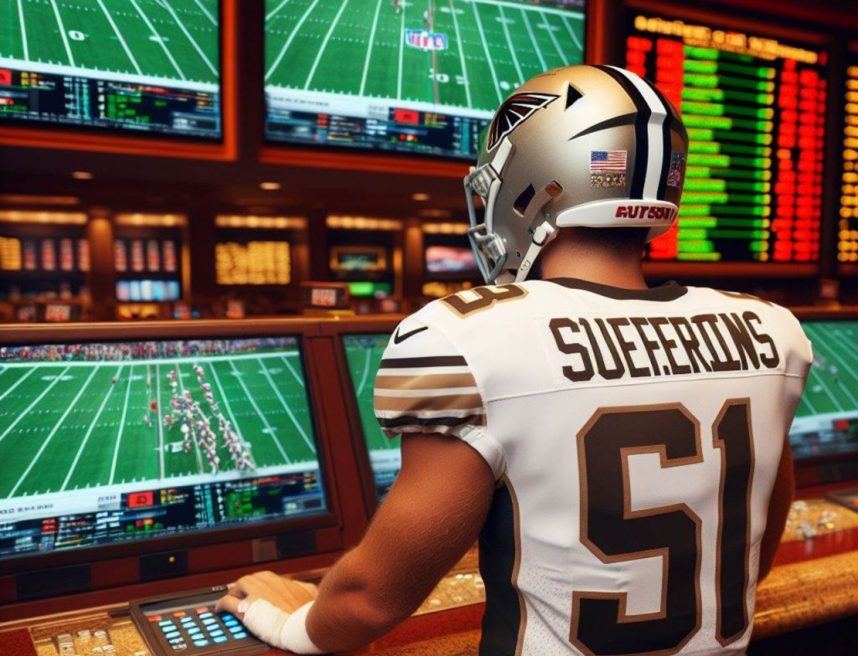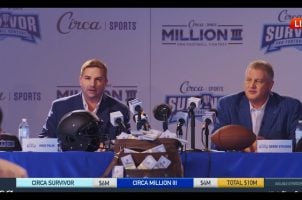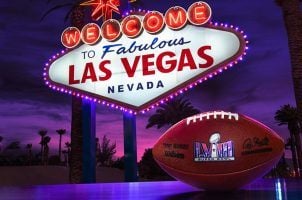Why the NFL Once Shunned Las Vegas and Why That Changed
Posted on: February 5, 2024, 02:26h.
Last updated on: February 6, 2024, 12:32h.
This Sunday, an idea that would have seemed preposterous just a decade ago will become reality. What happens in Vegas now includes the Super Bowl.

As Bellagio Lake gets remade into a hub for national CBS Sports coverage — including the Luxor wrapped as a giant Dorito — the NFL and Las Vegas might seem to many like a natural fit. But until 2015, the idea of Las Vegas ever even hosting a professional sports team seemed like a foolish bet to take.
Size Matters
Though Sin City had been a major tourist destination since the 1950s, its local population was the first stumbling block. Clark County wouldn’t even boast half a million residents until 1982. That wasn’t considered nearly enough of a home base by any of the four major professional sports leagues.
So, like many other residents of secondary US cities, Las Vegans learned not to set their hopes any higher than the minor leagues.
However, the population of the Las Vegas metropolitan region reached 1 million in 1995, then doubled that by 2009, growing at the third-fastest rate in the country. Suddenly, Las Vegas was one of the largest U.S. cities without a major league sports team.
And that’s because population wasn’t the only issue.
Don’t Bet on It
The pro leagues simply wouldn’t consider Las Vegas for a relocation or expansion team. That’s because it seemed too risky to place a team where sports betting was not only legal, but part of the community’s lifeblood. Since the mid-1990s, dozens of pro-league presidents and team owners have uttered some variation of the “it’ll never happen” quote.
That’s because sports fans can forgive bigotry, harassment, and even some serious crimes committed by players and coaches. But when it comes to betting on the outcomes of events in which they participate, even the appearance of impropriety was a line that couldn’t be crossed. It’s why the names Pete Rose and the Chicago Black Sox have never exited the public consciousness.
Of all the pro leagues, the NFL had the toughest stance toward Las Vegas.
Before the U.S. Supreme Court rejected the federal ban on sports betting in 2018, the NFL prohibited its players from wagering on any sports games. That meant an active player couldn’t even visit Las Vegas and place a bet on a March Madness game or bet on the NBA playoffs.
Citing a clause in its TV contracts prohibiting gambling-related ads, the NFL even refused to run the “What Happens Here…” Vegas tourism commercial during the 2003 Super Bowl, though the ad didn’t even mention gambling or casinos.
“The NFL cannot be compensated in damages for the harm sports gambling poses to the goodwill, character, and integrity of NFL football and to the fundamental bonds of loyalty and devotion between fans and team that the League seeks to maintain.”
That’s what future NFL commissioner Roger Goodell, then its senior VP of broadcasting, wrote in 2012 testimony for a lawsuit to block then-New Jersey governor Chris Christie’s bid to legalize sports betting in his state.
A Different Game
The tide began changing in 2015. That’s when Raiders owner Mark Davis now admits to secretly meeting with Bo Bernhard, then director of the UNLV International Gaming Institute. That meeting resulted in a white paper Davis took to the league to make his case for Las Vegas as an NFL town.
NFL owners approved the Raiders’ plans to relocate from Oakland two years later. That same year, the Las Vegas Golden Knights NHL team proved that professional sports could survive in Las Vegas without a betting scandal and thrive.
The pro leagues’ sudden about-face on Las Vegas also resulted from changing political and technological landscapes.
After the Supreme Court decision, states beyond Nevada lined up to legalize sports betting. It’s legal in 38 states, the District of Columbia, and Puerto Rico. With betting now just a couple of clicks of a smartphone away for most adults, Las Vegas and its casinos no longer pose the same unique brand of existential threat.
In 2021, the NFL struck its own sports betting partnership deals with Caesars Entertainment, DraftKings, and FanDuel. By 2022, the NFL held its first draft and two of its Pro Bowls in Las Vegas. And in September, NFL team-branded slot machines even hit the floors at some Vegas casinos.
“It was our job to make sure we react to the world around us,” David Highhill, the NFL’s general manager for sports betting, told ABC News.
Related News Articles
Circa Rolls Out ‘Empathy Package’ for Survivor Losers
Circa Million, Survivor to Feature Record $14M Payout
DraftKings Scraps Fantasy Football Draft Amid Collusion Concerns
NFL Warns Players About Las Vegas Activities During Super Bowl LVIII
Most Popular
Mirage Las Vegas Demolition to Start Next Week, Atrium a Goner
Where All the Mirage Relics Will Go
Most Commented
-
Bally’s Facing Five Months of Daily Demolition for Chicago Casino
— June 18, 2024 — 12 Comments -
Chicago Pension Mess Highlights Need for Bally’s Casino
— July 2, 2024 — 5 Comments
















Last Comment ( 1 )
The NFL and gambling, like swelke. I dont why 7-11 doesn't take bets too.